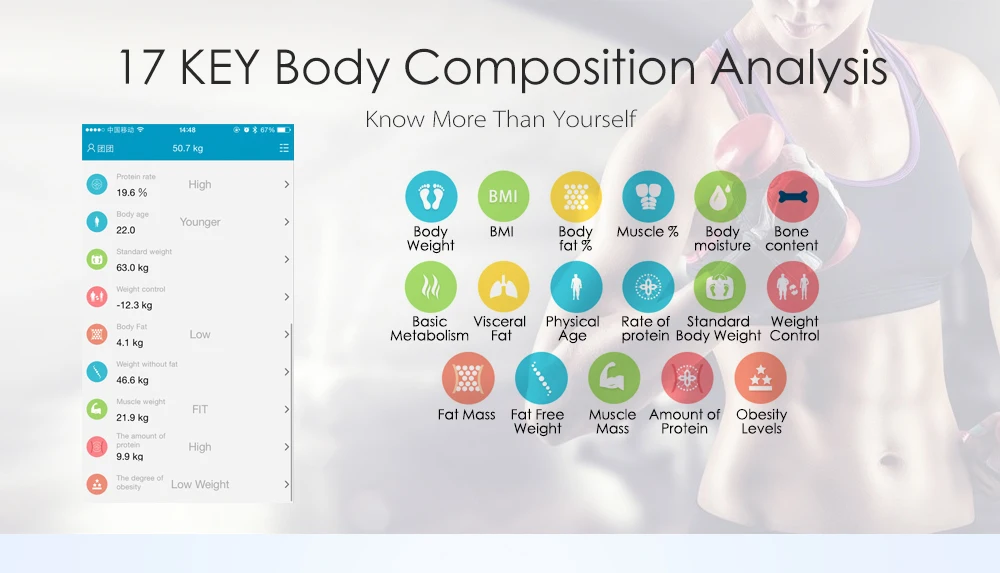There are 17 key metrics of health and wellness. Do you know how to properly measure, track and impact your personal health?
Illness, obesity, insomnia, and other issues are common products of an unhealthy lifestyle. Things like, "I have no time to exercise" or "I am busy" are often excuses.
Maybe your first thought to address the problem is more workouts, or a crash diet; unfortunately, not knowing where to start and which metrics to target will lead to nowhere.
First, you need a better understanding of your personal health data, in order to form a plan of attack and work toward your goals.
FitTrack products, including smart scales and smartwatches, help you measure the most important 17 health metrics, specific to your body. The scale not only measures your weight, it uses sensors to calculate your body mass index (BMI), body fat percentage, and more. Even better, FitTrack smart scales are as accurate as a pricey DEXA scan.
The free FitTrack Health App saves and displays your results, enabling you to keep track of goals and progress.

Body Composition
Body composition is the proportion of fat and fat-free mass in your body, it is usually used to describe the percentages of fat, bone, water, and muscle in human bodies.

Body Mass Index
Body mass index (BMI) is a measure of a person's body fat relatively using the height and weight as a basis for calculation. The BMI is defined as the body mass divided by the square of the body height and is universally expressed in units of kg/m², resulting as the mass in kilograms and height in meters squared.
BMI=Weight/mass(Kg)/Height(m²)
This FitTrack scale calculates and shows the exact result of whether the individual is underweight or overweight. Say for example a person who is 5’ 10” in height and is 72 kilograms has a healthy BMI of 22.8, which is considered normal. A Body Mass Index of 25.4 or higher is considered overweight, while the scope for a healthy range is considered 19 to 25. The Body Mass Index measurements mostly apply to adults ages 18-65 years.
Let's dig deeper into how FitTrack devices determine your correct body composition, and the meaning of each measurement:
Body Fat Percentage
Body fat percentage is basically the percentage of fat your body contains. It is divided into two categories mainly essential body fats and storage body fats. Essential body fat is vital to maintaining life and overall health, while storage body fat consists of fat accumulation in the tissue. Either way, both have important roles in our bodily functions.
The American Council on Exercise (ACE) created the body fat percentage chart below, which is now widely used to determine the correct percentage of fat for men and women. As shown the lesser percentage the fat is the more it is described to be essential, it varies however between the gender.
Another chart which is the Jackson and Pollock body fat percentage chart shows a different equation on how to determine body fat percentages a clearer list that includes the age for a much more effective basis.
Given an example, a 30-year-old man or woman should have a 12.7% body fat and 19.3% respectively. It should also be noted that as the age increases, so is the body fat percentage.
For a more clear picture, the two charts below are specifically made for men and women:
Bone Mass
Bone mass, or Bone mass density, is the measurement of the number of minerals (mostly phosphorous and calcium) contained in bone tissue.
The average bone content for adults is 3-5%. These measurements should be kept track over a period of time as bone mass can decrease gradually with age.
The following are factors that affect and may increase the risk of bone mass loss:
- Age
- Medical conditions
- Menopause for women
- Low-calcium diets
- Inherited traits
- Irregular exercise
- Smoking
Men's Bone Mass Chart
- <143 lbs = 5.9 lb
- 143-209 lbs = 7.3 lb
- >209 = 8.1 lb
Women's Bone Mass Chart
- <110 lbs = 4.3 lb
- 110lb-165 lb = 5.3 lb
- >165 = 6.5 lb
Muscle Mass
Muscle mass is the volume or the physical size of muscles in the body. It includes skeletal muscles, smooth muscles, and water contained in the muscles.
The usual body mass ranges from 60 to 90% of body weight anywhere above that or below that margin is considered not normal.
To achieve a healthy range of muscle mass, one should keep track of his or her progress. FitTrack devices use all your body data to aggregate muscle weight and mass, and show your progress of any muscle gain or loss.
Ideal Muscle Mass Chart
For men:
- Low - Less than 40%
- Ideal - Between 40% and 60%
- High - More than 60%
For women:
- Low - Less than 30%
- Ideal - Between 30% and 50%
- High - More than 50%
Water Composition
Water composition is the total amount of fluid in the human body. Most of the water in a human body is contained inside the cells, and water is the building block for cells.
An average human body is made up of 60-70% water, the brain has 75%, and the blood 82%; infants are said to have a higher percentage of water, ranging from 75 to 80%, but this decreases the number to 66% by the age of 1.
The body needs to maintain a proper water balance for it to fully function; however, there are certain factors that cause a gradual decrease of water in the human body:
- Illnesses that include Diarrhea or a high fever
- Humid or hot weather
- Kidney problems
- Exercise
- High-sodium diet
- Pregnancy and Breastfeeding for women
Water is as important as the food that we eat, as it helps regulate body temperature and maintains other bodily function; almost all major systems in the body depend on water.
Daily routines that include physical activities contribute more to a water loss of the body, so it is vital to keep hydrated. FitTrack smart scale and free app track and record aspects of water composition to ensure hydration level is ideal for your body.
To conclude, a healthy body is about much more than just weight.
Many other factors, from muscle rate to body hydration, play factors in overall wellness. If you're using a basic scale to measure only weight loss or weight gain, you're missing important opportunities to impact your health.
FitTrack gives you an accurate and holistic picture of health, and its 17 health metrics allow you to set attainable goals, and reach them.











